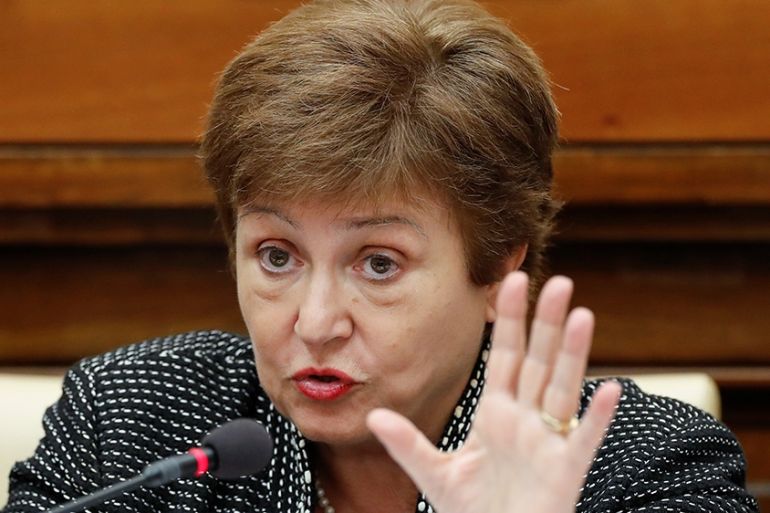IMF chief wants to triple favourable financing for poor members
Georgieva says there is full support ‘to go on the offensive’ and boost concessional IMF funding for poorer countries.

International Monetary Fund Managing Director Kristalina Georgieva said on Wednesday that the Fund is deploying all of its resources to proactively meet the challenges posed by the coronavirus pandemic and is looking to triple its concessional financing for the world’s poorest countries to over $18bn.
“We have full support of the membership to go on the offensive to raise more capacity for concessional funding from the IMF. Our target is to triple what we do for those countries,” she told a press briefing held by videoconference.
Keep reading
list of 3 itemsCoronavirus: G20 suspends debt payments for poorest countries
IMF says ‘worst recession since Great Depression’ is likely
Earlier, Georgieva issued a statement to a meeting of Group of 20 (G20) finance ministers and central bank governors, saying the Fund was “urgently seeking $18bn in new loan resources for the Poverty Reduction and Growth Trust, and will also likely need at least $1.8bn in subsidy resources”.
She also told the briefing there is “emerging consensus” to deploy existing Special Drawing Rights (SDRs) to allow more lending to developing countries.
SDRs are essentially a reserve asset created by the IMF from a basket of currencies including the United States dollar, Japanese yen, Chinese yuan, euro and British pound. Essentially an artificial currency, an SDR allocation is a low-cost way of bolstering IMF member states’ international reserves during times of extreme stress.
But Georgieva’s statement that a consensus is building to create new SDRs is at odds with a statement from G20 finance leaders that said the group had reached no consensus over the use of SDRs, either through a new allocation or through lending “excess” SDRs to poor countries.
A new allocation of SDRs to IMF members could add hundreds of billions of dollars in new liquidity, but the US has opposed the move, in part because it would provide ample resources to countries with no conditions to China and Iran, Reuters News Agency has reported.
The G20 officials did call on the IMF “to explore additional tools that could serve its members’ needs as the crisis evolves, drawing on relevant experiences from previous crises”.
The IMF issued $250bn in new SDRs to member countries in 2009, a move that boosted liquidity and market confidence during the depths of the last financial crisis.
Georgieva said she was hopeful that a consensus built around a G20 deal to allow poor countries to suspend payments on official bilateral debt would set the stage for more consensus to expand IMF resources to deal with fallout from the pandemic.